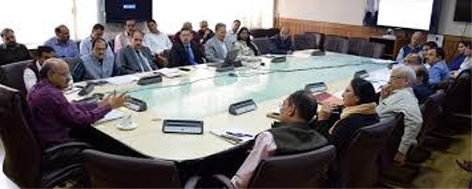Unless proper monitoring was ensured, expected results would continue to elude policy planners. With monitoring comes evaluation automatically that can be employed to systematically measure and assess work related activities especially when they are development related. Lieutenant Governor, Girish Chandra Murmu therefore, has rightly stressed upon close monitoring of developmental works and their speedy execution. It was only by means of effective monitoring that progress of implementation of a project and works related thereto and outputs in a systematic manner that desired results were achieved. Are any changes needed, are any difficulties encountered or again, was any wilful slow pace in works being resorted to, could only be ascertained by effective monitoring and keeping a detailed account thereof. Since as per experience, the element of funds and absence of their timely releasing very often results in spoilsport, regular monitoring would take care of that too so that development works did not suffer.
It is an established fact that while sitting in cosy environs of offices, monitoring and assessment could not be done in the real sense, it was imperative, therefore, that respective higher authorities in person, paid field visits at regular intervals so as to check whether projects were being implemented effectively which were likely to have a measurable impact. It is, therefore, in the fitness of things that the Lt. Governor has desired that Administrative Secretaries to do the job as was decided in a high level meeting of Administrative Secretaries which he chaired recently. Most of the projects and works related to them run into rough weather and ultimately, lead to cost escalation which could effectively be checked and even prevented should there be a monitoring structure in existence to assess work activities, how much was planned and targeted to be completed and whether motivational pushes and briefs were required to be given to frontline workers to ensure adherence to timelines and at the same time maintaining qualities. Most of the projects are unfortunately running into initial hiccups and in the absence of proper attention and regular monitoring, end up in closures or abandoned or half done to revive whom, the lethargy of officialdom takes usually longer time and it costs much more than estimated cost even on higher side estimations.
At least, minimum one field visit on weekly basis, as advised by the Lt. Governor would definitely result in getting first hand appraisal of the status and the fate of a particular development work and sort out difficulties, if any. On the other hand, it is generally observed that in most of such works which are Centrally sponsored under national flagship schemes, local coordination was missing which delayed the reaping of benefits from them for the targeted sections of the society. Since such schemes on a wider perspective, were also developmental in nature and for the benefit of the people in the Union Territory , it should be mandatory to treat those works at par with the ones sponsored by the UT Government.
One more important thing which was needed the most, was interaction with the people to get to know from the actual area of execution of a particular work about how they felt about the particular project and their views about them. Earmarking half of the days from out of the otherwise “hectic” office schedule by Administrative Secretaries and HoDs for meeting people in the Secretariat and HoD offices and appropriate time for meeting public representatives, were measures to bridge the deficit of trust between the public and the bureaucracy and remove the apprehensions that grievances and nature of problems were not heard and resolved. Public delivery mechanism needed to be toned up, files movement between tables at individuals’ will needed to be viewed seriously and replaced by a system of what is known as “file tracking” or what time at which table or authority, did the file take to move. Last but not the least, decisions making process should be toned up, improved and any shortcomings viewed as incompetence of a particular authority, only then holistic development of the UT of Jammu and Kashmir could be made possible.
Trending Now
E-Paper


